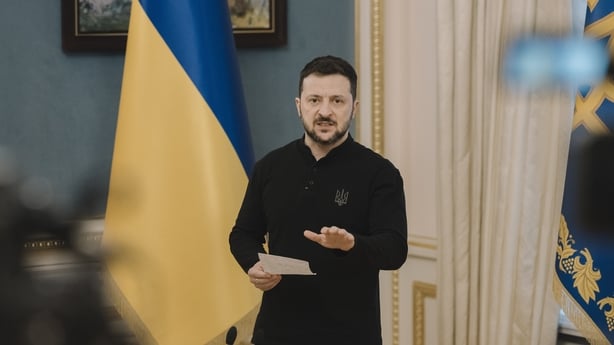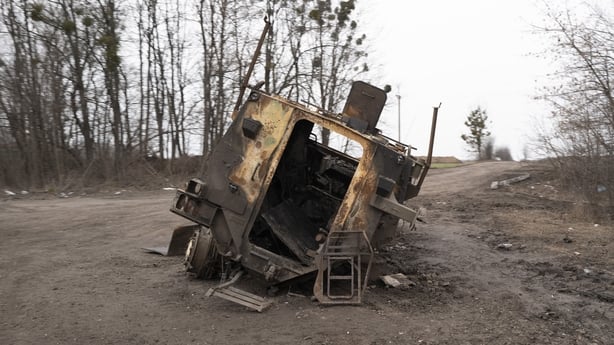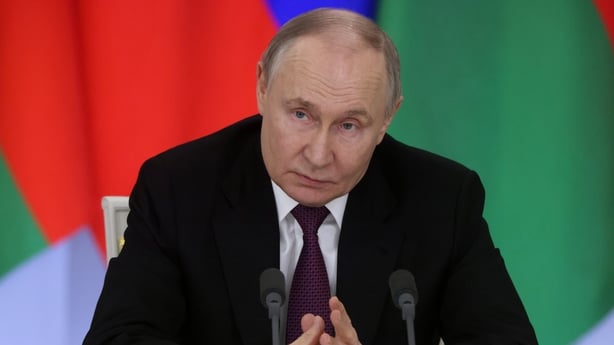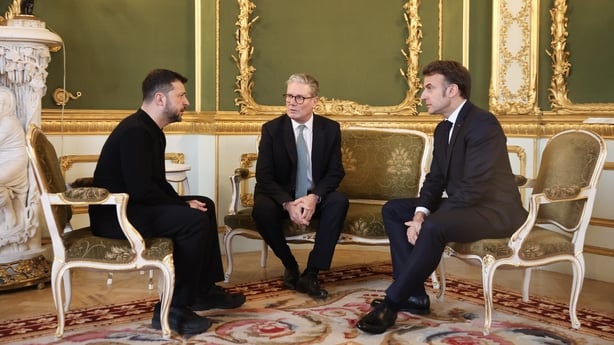UK Prime Minister Keir Starmer said the "ball was in Russia's court" and that President Vladimir Putin would "sooner or later" have to "come to the table," after a virtual summit to drum up support for a coalition willing to protect any eventual ceasefire in Ukraine.
The British leader told some 26 fellow leaders, as they joined the group call hosted by Downing Street, that they should focus on how to strengthen Ukraine, protect any ceasefire and keep up the pressure on Russia.
While Ukraine had shown it was the "party of peace" by agreeing to a 30-day unconditional ceasefire, "Putin is the one trying to delay," Mr Starmer said.
"If Putin is serious about peace, I think it's very simple, he has to stop his barbaric attacks on Ukraine and agree to a ceasefire, and the world is watching," he added.
Military chiefs will now meet again on Thursday in the UK as the coalition moves into "the operational phase," Mr Starmer said after the talks.
"The group that met this morning is a bigger group than we had two weeks ago, there is a stronger collective resolve and new commitments were put on the table this morning," he added.
Ukrainian President Volodymyr Zelensky warned that Russia wanted to achieve a "stronger position" militarily ahead of any ceasefire, more than three years since it invaded his country.

"They want to improve their situation on the battlefield," Mr Zelensky said at a press conference in Kyiv.
The ceasefire proposal by the United States comes as Russia has momentum in many areas of the front in Ukraine.
The Russian leader did not commit to an immediate ceasefire proposed by the US, instead listing a string of demands.
However, Mr Zelensky claimed that Mr Putin is "lying about how a ceasefire is supposedly too complicated."
'Just and lasting peace'
European Commission President Ursula von der Leyen said in a message on X, formerly Twitter, that Russia has to show "it is willing to support a ceasefire leading to a just and lasting peace".
Dutch Prime Minister Dick Schoof also said on X, formerly Twitter, it was "now important to continue to exert pressure on Russia to come to the negotiating table."
Overnight fighting continued in the relentless three-year war, with Russia saying it had taken two more villages in its Kursk border region where it has launched an offensive to wrest back seized territory.

As moves have gathered pace for a ceasefire, Russia has pushed this week to retake a large part of the land that Ukraine originally captured in western Kursk.
But Mr Zelensky denied any "encirclement" of his troops in the Kursk region.
"Our troops continue to hold back Russian and North Korean groupings in the Kursk region," he said on social media.
The Russian defence ministry said troops took control over the villages of Zaoleshenka and Rubanshchina - north and west of the town of Sudzha, the main town that Russia reclaimed this week.
'Putin not serious about peace'
Ukraine, meanwhile, said its air force had overnight downed 130 Iranian-made Russian-launched Shahed drones over 14 regions of the country.
"The Kremlin's complete disregard for President Trump's ceasefire proposal only serves to demonstrate that Putin is not serious about peace," Mr Starmer said yesterday.

Mr Starmer and French President Emmanuel Macron have been leading efforts to assemble a so-called "coalition of the willing" ever since Mr Trump opened direct negotiations with Russia last month.
They claim the group is necessary - along with US support - to provide Ukraine with security guarantees by deterring Mr Putin from violating any ceasefire.
Mr Starmer and Mr Macron have said they are willing to put British and French troops on the ground in Ukraine but it is not clear if other countries are keen on doing the same.
'Stop the violence'
Mr Macron also called on Russia to accept the proposal for a ceasefire, and stop making statements aimed at "delaying the process".
Germany likewise criticised Mr Putin's response to the US-proposed ceasefire in Ukraine as "at best a delaying tactic".
US Secretary of State Marco Rubio said yesterday that he was "cautiously optimistic" about reaching a truce but acknowledged there was "a lot of work that remains to be done".
Mr Starmer has said he welcomes any offer of support for the coalition, raising the prospect that some countries could contribute logistics or surveillance.

However, Italian Prime Minister Giorgia Meloni reiterated after the call, which she joined, that Italy's "participation in a possible military force on the ground is not envisaged".
Earlier, Mr Putin's first prime minister Mikhail Kasyanov, who now opposes the Russian president, said his former boss would not accept NATO or European troops being deployed to Ukraine, but might agree to soldiers from "friendly countries" such as India and Brazil.
Meanwhile, both Russia and Ukraine launched drone attacks overnight, each reporting more than 100 enemy drones entering their respective airspaces.
No casualties have been reported and both countries' defence ministries claim to have shot down around 130 enemy drones.

